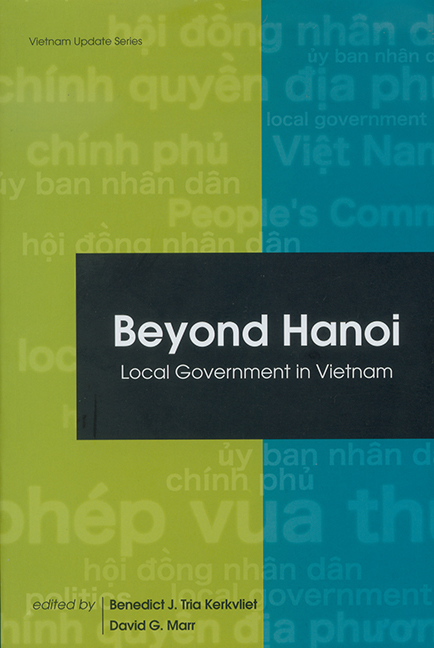Book contents
- Frontmatter
- Contents
- Preface
- Abbreviations
- 1 Surveying Local Government and Authority in Contemporary Vietnam
- 2 A Brief History of Local Government in Vietnam
- 3 Village Government in Pre-colonial and Colonial Vietnam
- 4 Caught in the Middle: Local Cadres in Hai Duong Province
- 5 Winter Crop and Spring Festival: The Contestations of Local Government in a Red River Delta Commune
- 6 Local Politics and Democracy in a Muong Ethnic Community
- 7 Local Government in the Exercise of State Power: the Politics of Land Allocation in Black Thai Villages
- 8 Urban Government: Ward-level Administration in Hanoi
- 9 The Facilitators of Rural Transformation and Development: The Role of Agricultural Extension Officers in Two Districts of Long An Province
- 10 Ho Chi Minh City's Post-1975 Political Elite: Continuity and Change in Background and Belief
- 11 Push, Pull, and Reinforcing: The Channels of FDI Influence on Provincial Governance in Vietnam
- Glossary of Vietnamese Terms
- Index
- About the Contributors
5 - Winter Crop and Spring Festival: The Contestations of Local Government in a Red River Delta Commune
Published online by Cambridge University Press: 21 October 2015
- Frontmatter
- Contents
- Preface
- Abbreviations
- 1 Surveying Local Government and Authority in Contemporary Vietnam
- 2 A Brief History of Local Government in Vietnam
- 3 Village Government in Pre-colonial and Colonial Vietnam
- 4 Caught in the Middle: Local Cadres in Hai Duong Province
- 5 Winter Crop and Spring Festival: The Contestations of Local Government in a Red River Delta Commune
- 6 Local Politics and Democracy in a Muong Ethnic Community
- 7 Local Government in the Exercise of State Power: the Politics of Land Allocation in Black Thai Villages
- 8 Urban Government: Ward-level Administration in Hanoi
- 9 The Facilitators of Rural Transformation and Development: The Role of Agricultural Extension Officers in Two Districts of Long An Province
- 10 Ho Chi Minh City's Post-1975 Political Elite: Continuity and Change in Background and Belief
- 11 Push, Pull, and Reinforcing: The Channels of FDI Influence on Provincial Governance in Vietnam
- Glossary of Vietnamese Terms
- Index
- About the Contributors
Summary
For nearly two decades, the Vietnamese countryside has experienced momentous socio-economic change. Decollectivization in agriculture has given rise to the household economy as well as the increasing participation of people in the political process at the local level. The countryside has witnessed not only improvements in material living conditions but also a revival of religious rituals and communal activities. These economic, social and cultural changes have attracted scholarly interest across a wide range of disciplines, from political science and economics to history and anthropology. There are additional scholarly works that focus on the relations between the government and its citizens at the national, regional and local levels. While some scholars look at the impact of renovation on socio-economic life, others search for ways in which the dynamics of life at the local level contribute to changing policy. Other scholars look at different arenas of contestation, such as land conflicts between villages or between households. Some ethnographers pay special attention to the ways in which local governments incorporate cultural norms and meanings into the political process whereby leaders are selected.
In this chapter, I discuss the interaction between local government and authority and local people by providing an ethnographic case study of Dong Vang village (Hoang Long commune, Phu Xuyen district, Ha Tay province). The chapter focuses on two major Hoang Long projects that occurred during the past four decades: an attempt to boost agricultural production through the enforcement of winter crop yields; and the control of religious practice in villages. By showing that intracommune differentiations embed these two projects in history, I demonstrate how these policies fall into two arenas of contestation between local governments and their people. Based on extended research in the village in 1998–99, I argue that the relations between Dong Vang villagers and Hoang Long authorities have been contentious, at times even hostile, not only because authorities attempted to implement central policies that were not well received among villagers but also due to deeply rooted prejudice of commune authorities against Dong Vang.
- Type
- Chapter
- Information
- Beyond HanoiLocal Government in Vietnam, pp. 110 - 136Publisher: ISEAS–Yusof Ishak InstitutePrint publication year: 2004



